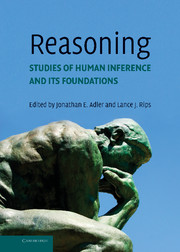Book contents
- Frontmatter
- Contents
- Preface
- List of Contributors
- Introduction: Philosophical Foundations
- PART I FOUNDATIONS OF REASONING
- PART II MODES OF REASONING
- PART II INTERACTIONS OF REASONING IN HUMAN THOUGHT
- Section 9 Reasoning and Pragmatics
- Section 10 Domain-Specific, Goal-Based, and Evolutionary Approaches
- 39 Domain-Specific Knowledge and Conceptual Change
- 40 Pragmatic Reasoning Schemas
- 41 Beyond Intuition and Instinct Blindness: Toward an Evolutionarily Rigorous Cognitive Science
- 42 Use or Misuse of the Selection Task? Rejoinder to Fiddick, Cosmides, and Tooby
- 43 Why We Are So Good at Catching Cheaters
- 44 The Modularity of Mind: An Essay on Faculty Psychology
- 45 Commitment
- 46 Evolution of Inference
- Section 11 Reasoning and Cultures
- Section 12 Biology, Emotions, and Reasoning
- Index
- References
45 - Commitment
Published online by Cambridge University Press: 05 June 2012
- Frontmatter
- Contents
- Preface
- List of Contributors
- Introduction: Philosophical Foundations
- PART I FOUNDATIONS OF REASONING
- PART II MODES OF REASONING
- PART II INTERACTIONS OF REASONING IN HUMAN THOUGHT
- Section 9 Reasoning and Pragmatics
- Section 10 Domain-Specific, Goal-Based, and Evolutionary Approaches
- 39 Domain-Specific Knowledge and Conceptual Change
- 40 Pragmatic Reasoning Schemas
- 41 Beyond Intuition and Instinct Blindness: Toward an Evolutionarily Rigorous Cognitive Science
- 42 Use or Misuse of the Selection Task? Rejoinder to Fiddick, Cosmides, and Tooby
- 43 Why We Are So Good at Catching Cheaters
- 44 The Modularity of Mind: An Essay on Faculty Psychology
- 45 Commitment
- 46 Evolution of Inference
- Section 11 Reasoning and Cultures
- Section 12 Biology, Emotions, and Reasoning
- Index
- References
Summary
Modular Rationality
In Stanley Kubrick's 1963 film, Dr. Strangelove, or How I Learned to Stop Worrying and Love the Bomb, the USSR has built a doomsday machine – a device that, when triggered by an enemy attack or when tampered with in any way, will set off a nuclear explosion potent enough to destroy all human life. The doomsday machine is designed to be set off by tampering, not to guard it from the enemy but to guard it from its builders having second thoughts. For surely if there were an attack, it would be better for the USSR to suffer the effects of the attack than to suffer the combined effects of the attack and the doomsday machine. After an attack, if they could, they would disable the doomsday machine. And if their enemies could anticipate this, the doomsday machine would lose its power to deter aggression. For this reason, the commitment to retaliate had been built into the doomsday machine. Deterrence requires that all this be known. There is a memorable scene in the film in which Peter Sellers as Dr. Strangelove shouts over the hotline: “You fools! A doomsday machine isn't any good if you don't tell anyone you have it!”
Hollywood is not that far from Santa Monica, where cold war strategies were analyzed at the RAND Corporation. Hermann Kahn reports a typical beginning to a discussion of the policy of massive retaliation:
One Gedanken experiment that I have used many times and in many variations over the last twenty-five or thirty years begins with the statement: “Let us assume that the president of the United States has just been informed that a multimegaton bomb has been dropped on New York City. […]
- Type
- Chapter
- Information
- ReasoningStudies of Human Inference and its Foundations, pp. 915 - 926Publisher: Cambridge University PressPrint publication year: 2008



